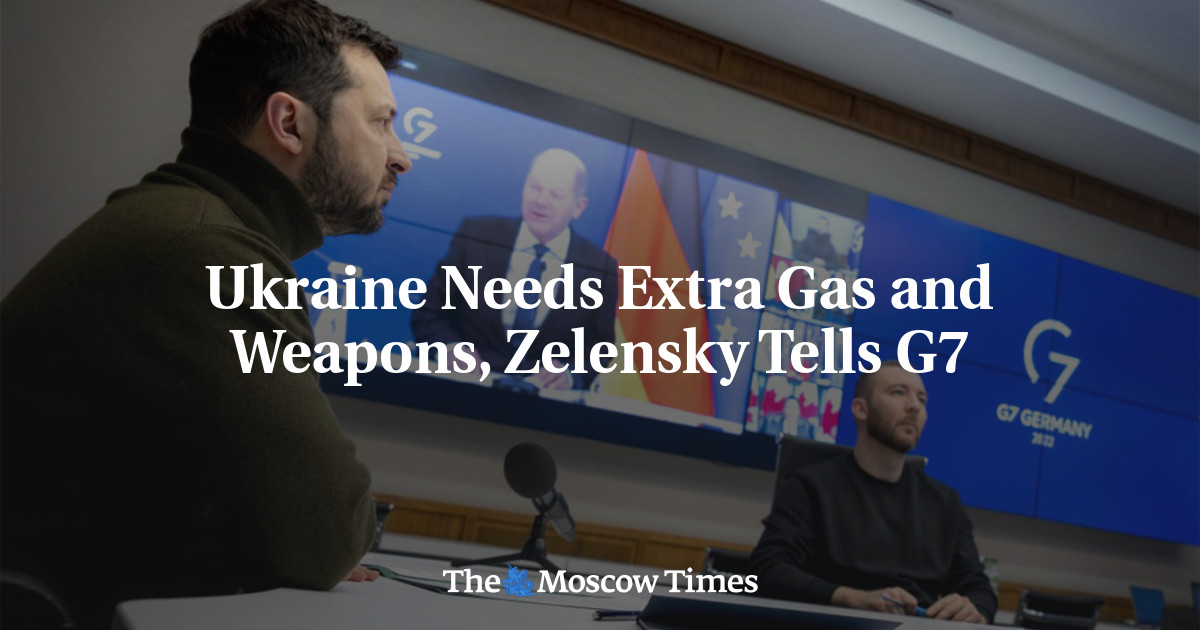
President Volodymyr Zelensky urged G7 nations on Monday to provide extra gas and weapons to help Ukraine survive a brutal winter that threatens to bring further suffering to millions in the war-torn country.
With snow on the ground and Ukraine’s energy grid battered by Russian strikes, many are facing freezing temperatures without power or heating.
During a video conference with the G7 club of wealthy nations on Monday, Zelensky said Ukraine needs “about 2 billion cubic meters” of additional gas to get through the winter.
He also urged the G7 to send more arms to Ukraine, including “modern tanks” as well as “rocket artillery and more long-range missiles.”
Western-supplied weapons have helped turn the tide in the war, and a senior U.S. military official said Monday that Russia is likely turning to older, less reliable artillery and rocket ammunition as its newer stocks run low.
But Zelensky said “Russia still has the advantage in artillery and missiles.”
“This is a fact,” he told the G7. “These capabilities of the occupying army are the ones to fuel the Kremlin’s arrogance.”
‘We will survive’
Meanwhile, in the strategic Ukrainian port of Ochakiv, officials are hoping the Black Sea naval base can serve to consolidate Kyiv’s gains in the southern Kherson region.
After failing to seize the port, Russian troops have been pummelling Ochakiv from the nearby Kinburn peninsula.
In the fog at the local market, 62-year-old Oleg Klyutshko said: “I am not afraid of winter… but I would like the strikes to stop. We will survive anything else.”
Kyiv says 40% of Ukraine’s critical energy infrastructure has been damaged, with wave after wave of targeted Russian attacks.
The Ukrainian energy ministry said in a statement that Russian missiles had hit all of the country’s thermal power plants, while 44 overhead high-voltage power lines had also been affected.
Power company YASNO said supply limitations in Kyiv were “significant” with some 40 percent of supplies diverted to critical infrastructure.
Oil and gas company DTEK said its specialists were “constantly looking for equipment to restore the energy infrastructure destroyed by Russia” and had agreed on contracts with European suppliers ABB and Siemens.
According to a readout issued by his office, Zelensky told the G7 “the terror against our power plants forced us to use more gas than expected.”
“This is why we need additional support over this particular winter,” he said.
The G7 groups Britain, Canada, France, Germany — which currently holds the club’s presidency — Italy, Japan and the United States.
G7 leaders agreed on key elements of a platform to coordinate financial support for Ukraine, German Chancellor Olaf Scholz said, before a summit in Paris on post-war reconstruction.
Zelensky also proposed a special summit, which he called the Global Peace Formula Summit, “to determine how and when we can implement the points of the Ukrainian Peace Formula,” which would secure Ukraine’s security and territorial integrity.
He invited the G7 industrialized nations “as well as other conscientious countries” to “show your leadership.”
The Ukrainian leader also urged Russia “to take a concrete and meaningful step towards a diplomatic settlement.”
Zelensky called on “the occupier” Moscow to leave Ukrainian territory by Christmas.
“The one who brought the war upon us has to take it away.”
‘Rethink’ nuclear security
An international conference hosted by France will kick off in Paris on Tuesday.
The gathering of politicians, blue-chip companies and aid agencies will focus on how Ukraine’s Western allies can provide immediate support to keep its civil infrastructure afloat amid incessant bombing by Russia.
Speaking to AFP ahead of Tuesday’s meeting, Ukraine’s energy minister German Galushchenko said in an interview that the war with Russia “completely changes our understanding of nuclear security.”
He pointed to Russia’s seizure of Ukraine’s Zaporizhzhia nuclear power plant — Europe’s largest atomic facility — which has raised alarm among Western allies as shelling has continued in the area throughout the nearly 10-month conflict.
“This situation absolutely pushes us to rethink what we should do from the point of view of (nuclear) safety,” Galushchenko told AFP. “That’s a question, too, to all the countries of the world.”
Leave a Reply